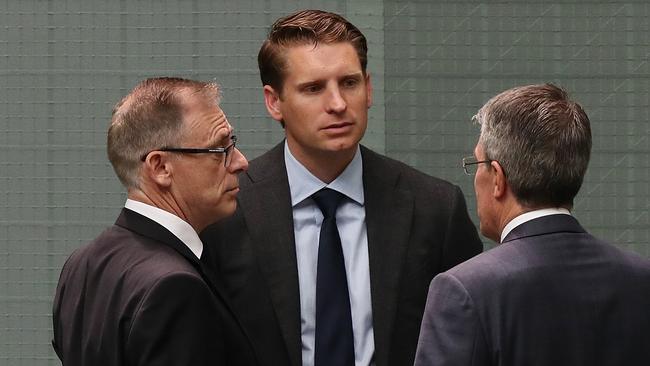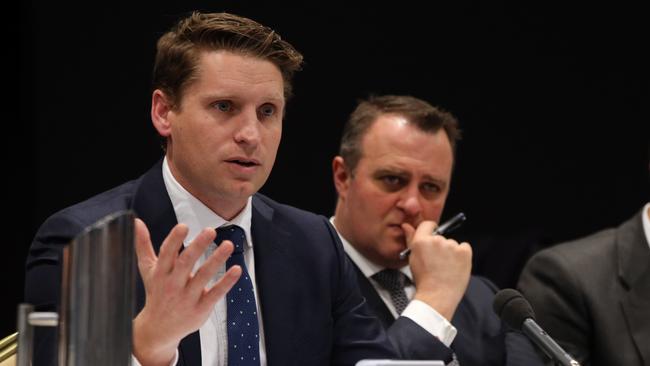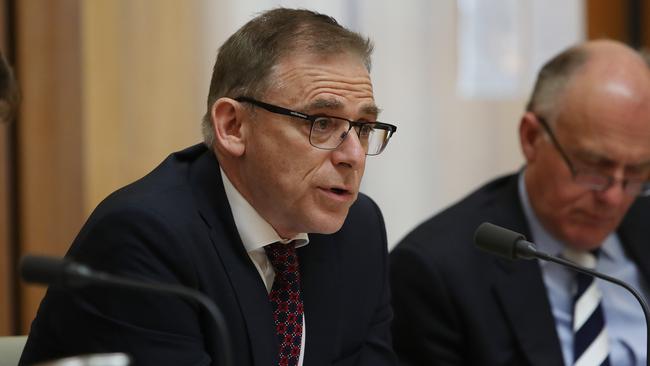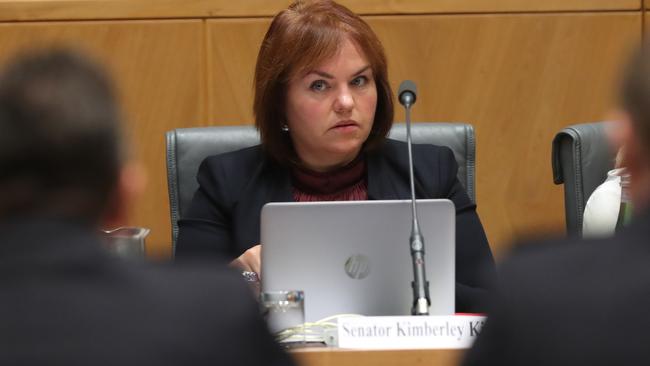Ellen Whinnett: Canberra Wolverines fighting the Reds
A group of politicians are united not by their political allegiances, but by a shared belief that the time has come for Australia to push back against the growing power of China, writes Ellen Whinnett.

Opinion
Don't miss out on the headlines from Opinion. Followed categories will be added to My News.
In the 1984 movie Red Dawn starring Patrick Swayze and Charlie Sheen, a brave group of high school kids form a resistance group and repel a Soviet invasion of the United States. They call themselves the Wolverines, after their school mascot.
In Canberra, another group of Wolverines has been formed.
The group comprises politicians united not by their political allegiances, but by a shared belief that the time has come for Australia to push back against the growing power of China.
The Wolverine reference is just a bit of fun, and occasionally involves the sending of wolf emojis in WhatsApp groups. There are unconfirmed reports some stickers might have been printed.
But don’t let the pop culture nickname mask the true intent of what’s going on here.
There is a determined pushback under way in Canberra on both sides of politics, and among senior members of the public service, to take a stand against some of the excesses being perpetrated by the Communist Party of China — the creeping attempts at influence, state-sponsored hacking programs, intellectual property theft and manipulation of groups such as university students.
No one will confirm being a member of the Wolverines, so let’s take an educated guess.

Earlier this year, four MPs took the unusual step of making a public statement to The Times of London, in what seemed to have been an (ultimately unsuccessful) attempt to dissuade the UK Government from allowing the Chinese telco Huawei to be part of the UK’s 5G network.
Those MPs were Liberals Andrew Hastie, James Paterson, Tim Wilson, and Labor’s Kimberley Kitching.
Hastie and Kitching had earlier founded a bipartisan group called the Parliamentary Friends of Democracy, a group set up to debate ways to reinforce and defend Australia’s robust democracy. At one lunch organised by the group, China experts from the Australian Strategic Policy Institute think tank briefed MPs over sandwiches about Chinese influence in universities and coercive economic diplomacy.
Paterson and Hastie were both denied a visa to China last year after publicly expressing concern over China’s influence at universities and its human rights abuses of the Uighur people. Wilson, who has spoken out against China since before he entered parliament, travelled to Hong Kong last year to support pro-democracy protesters.

Hastie is a former SAS captain who wrote an opinion piece about the need for western democracies to use “political warfare’’ to defend themselves from authoritarian regimes. He’s the chairman of the Joint Parliamentary Committee on Intelligence and Security.
The deputy chairman of the committee for the past 13 years, long-serving Labor member for Holt in Victoria, Anthony Byrne, is another major player in all this.
Byrne operates quietly — no opinion pieces or appearances on Sky for him — and when he speaks, people listen. He has probably the best contacts within the intelligence agencies and law enforcement of any member of parliament.
Two weeks ago, he took on UK foreign minister Dominic Raab during his visit to Canberra, strongly criticising the Huawei decision, warning it was a mistake and pointing out Australia and the US, other members of the Five-Eyes intelligence agreement, had deemed it too risky to allow Huawei into such critical national infrastructure.
The testy exchange exploded like a bomb and sent ripples across the oceans to the UK and the US, where the Americans privately cheered, and the UK sent letters of complaint. The PJCIS has now cancelled its planned trip to the UK and looks set to go to the US instead.
Byrne won’t comment on it, but the government has all but endorsed his comments, with Home Affairs Minister Peter Dutton getting to his feet in parliament to opine on national security matters, saying: “I don’t think there’s much that the member for Holt would say that anybody could argue against when it comes to these matters.”
He said both Mr Hastie and Mr Byrne “should be commended for the leadership you provide”.

Essentially, Byrne did what the government and security agencies wanted to do but couldn’t — tell the Brits exactly how unhappy Australia was with the decision to allow Huawei access to the telecommunications network.
“We call him the Undertaker — he operates in the shadows and just gets it done,’’ one Liberal who likes Byrne said.
A few weeks ago, stories emerged in the British press that a group of Tory MPs in London had started calling themselves the Wolverines and agitating against Huawei.
They were months behind the Australian Wolverines, who have been around since last year. And political resistance to China’s expanding power is manifesting itself in multiple ways in Canberra, not just through opposition to Huawei.
In 2017, then-prime minister Malcolm Turnbull abandoned plans for an extradition treaty with China, after MPs on all sides expressed concerns about the legitimacy of the Chinese judicial system and human rights abuses.
In February last year, Prime Minister Scott Morrison said a “sophisticated state actor’’ was behind the hacking of the national parliament’s computer systems — code for “China’’.
And bipartisan support is building in Australia for a Magnitsky Act — laws designed to name and sanction corrupt foreign figures.
Originally designed to target dodgy Russians, who are highly active in Europe and the US, the laws in Australia would be aimed squarely at China.
Ellen Whinnett is national politics editor.
